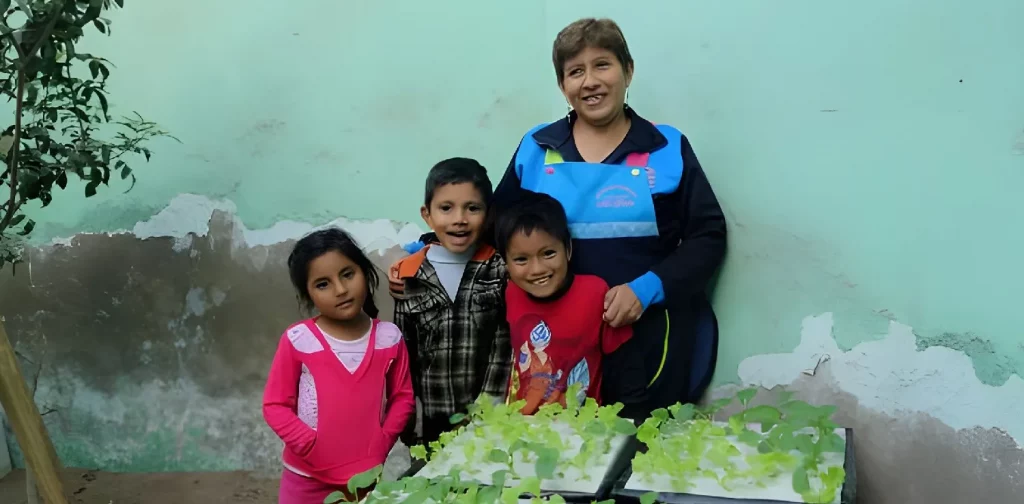H2Grow Helps Bring Hydroponics Farming to Vulnerable Communities

Photo: World Food Programme.
Climate change has made food production incredibly challenging. Land use change, extreme drought and flooding, and erratic weather patterns have disrupted the flow of agriculture production. At the same time, millions of people still live in hunger. Using the hydroponics farming method, the World Food Programme tries to bring farming solutions to vulnerable communities worldwide.
What is Hydroponics?
Essentially, hydroponics is a way to garden and cultivate plants without soil. The method uses water consisting of mineral and nutrient solutions as the plant’s nourishment source. Planting with the hydroponics method can be done pretty much everywhere, from spare backyards to apartment complexes, from indoor to outdoor spaces.
Hydroponics takes up less space, resources, and time than traditional agriculture. In light of climate change, world conflicts, and other crises, the method can provide an alternative way of farming, especially for those who lack proper land. This includes vulnerable and displaced communities around the world.
Still, despite seeming simple, hydroponics requires basic skills and knowledge to maintain. The H2Grow initiative by the World Food Programme (WFP) aims to bridge that gap.
H2Grow by WFP
The H2Grow initiative by the WFP aims to equip food-insecure communities in deserts, refugee camps, informal urban settlements, and other climate-impacted and conflict-ridden areas. It allows farmers to learn how to plant, manage, and sustain crops to strengthen their food resilience.
Localization is one of H2Grow’s key aspects. In the first stages of the initiative in 2016–2017, H2Grow was tested using a high-tech controlled hydroponics technology that was proven not field-ready. After adapting the technology to local contexts to create low-tech and accessible solutions, the initiative could eventually be replicated in other places.
As of 2022, H2Grow has reached over 89,000 people in 21 countries, nearly half of whom are women. The hydroponics method is also used to support homegrown school feeding programs in Burundi, Zambia, and other African countries. This means providing thousands of school children with nutritious food every day.
Empowering Local Communities
Empowerment can go a long way. As the world faces multiple crises at once, strengthening local communities’ agency and resilience becomes crucial. Therefore, the efforts for capacity building and policy interventions have become urgent worldwide, especially for basic skills and necessities such as food production. At the same time, governments, organizations, and all related stakeholders should also work together to minimize, adapt, and mitigate the impacts of the world’s crises.
Editor: Nazalea Kusuma

Co-create positive impact for people and the planet.
Amidst today’s increasingly complex global challenges, equipping yourself, team, and communities with interdisciplinary and cross-sectoral insights on sustainability-related issues and sustainable development is no longer optional — it is a strategic necessity to stay ahead and stay relevant.

Kresentia Madina
Madina is the Assistant Manager of Stakeholder Engagement at Green Network Asia. She holds a bachelor’s degree in English Studies from Universitas Indonesia. As part of the GNA In-House Team, she supports the organization's multi-stakeholder engagement across international organizations, governments, businesses, civil society, and grassroots communities through digital publications, events, capacity building, and research.


 Strengthening Resilience amid Growing Dependence on Space Infrastructure
Strengthening Resilience amid Growing Dependence on Space Infrastructure  Indian Gig Workers Push Back Against 10-Minute Delivery Service Strain
Indian Gig Workers Push Back Against 10-Minute Delivery Service Strain  Call for Governance: Grassroots Initiatives Look to Scale Efforts to Conserve Depleting Groundwater
Call for Governance: Grassroots Initiatives Look to Scale Efforts to Conserve Depleting Groundwater  Integrating Environment, Climate Change, and Sustainability Issues into Education Systems
Integrating Environment, Climate Change, and Sustainability Issues into Education Systems  Finally Enforced: Understanding the UN High Seas Treaty
Finally Enforced: Understanding the UN High Seas Treaty  Risks and Opportunities of Submarine Communication Cables for Sustainable Development
Risks and Opportunities of Submarine Communication Cables for Sustainable Development